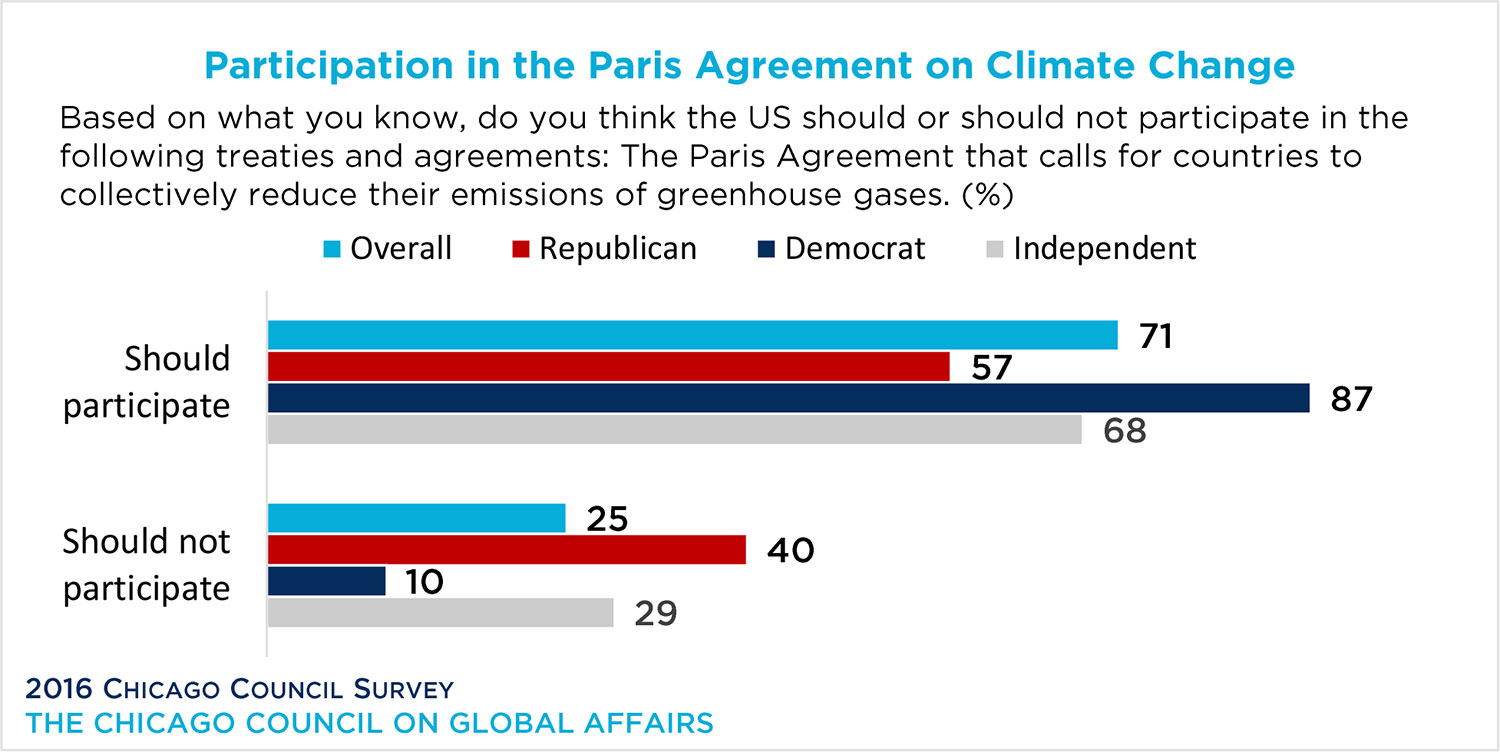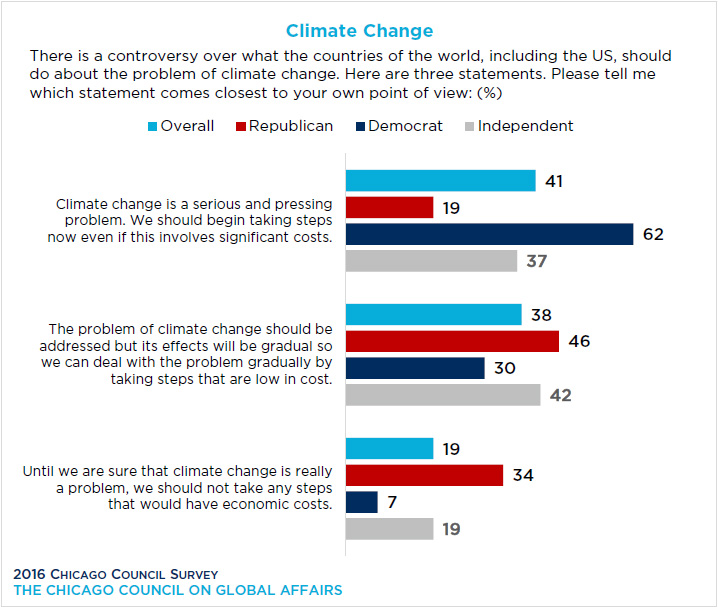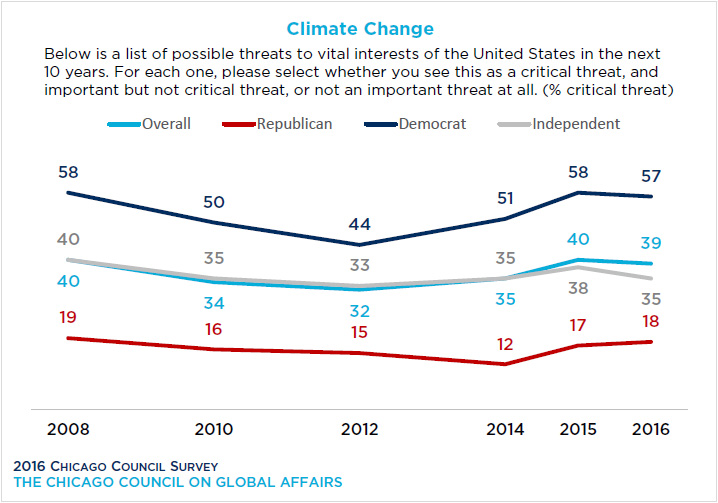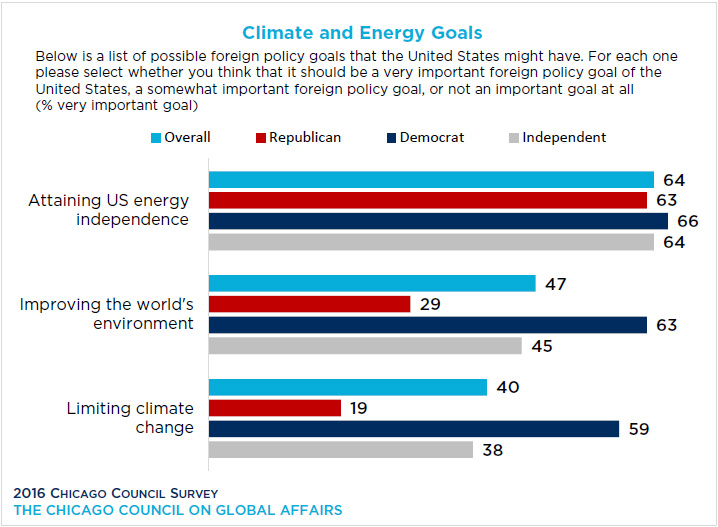Recent survey findings show that policies focused on furthering US energy independence are most likely to gain bipartisan support.
As the other signatories to the Paris Agreement on climate change wait to see whether the next US administration will comply with the deal, the 2016 Chicago Council Survey finds strong bipartisan support for US participation. In addition, support for taking at least gradual steps to mitigate climate change has risen over the past six years among Democrats, Republicans, and Independents. That said, Republicans and Democrats have sharply different views about how big a threat climate change poses and how urgently it should be addressed. The findings do suggest that climate change policies framed around furthering US energy independence are more likely to gain bipartisan support than attempts to reach an agreement on the root causes and urgency of addressing climate change.
Majorities across Party Lines Support US Participation in Paris Agreement
Bipartisan majorities support the climate change agreement negotiated in Paris last year which formally commits its 193 signatories—including the United States and China—to reduce greenhouse gas emissions. Seven in ten Americans (71%), including majorities of Republicans (57%), Democrats (87%), and Independents (68%) say that the United States should participate in the Paris Agreement that calls for countries to collectively reduce their emissions of greenhouse gases.
This data aligns with past Chicago Council Surveys which consistently show support for various international agreements to collectively address climate change. This includes the Kyoto Agreement as well as a more general international treaty to reduce greenhouse gas emissions. But Americans also support unilaterally reducing greenhouse gases: a recent survey conducted by the Yale Program on Climate Change Communication and the George Mason University Center for Climate Change Communication found that a majority of Americans support US reductions in greenhouse gas emissions regardless of other countries’ decisions.

Growing Desire to Take Action on Climate Change
When presented with three possible response options to best address climate change, four in ten Americans overall (41%) say climate change is a serious and pressing problem, and that we should begin taking steps now even if this involves serious costs. Among the overall public, this reading has increased twelve percentage points from 2010, when three in ten (29%) said the same.
A majority of Democrats (62%) versus two in ten Republicans (19%) say that “the United States should take steps now, even if it involves serious costs.” Democrats have become increasingly likely to support taking immediate steps: in 2010, half (49%) supported doing so, while now more than six in ten (62%) say the same. Independents have similarly become more likely to support immediate action on climate change (37%, up from 23% in 2010). Republican support for this position remains low, but has risen slightly in recent years (19%, up from 13% in 2010).
An additional four in ten among the overall US public (38%) say that “the problem of climate change should be addressed, but its effects will be gradual, so we can deal with the problem gradually by taking steps that are low in cost.” A plurality of Republicans (46%) favor this gradual, low-cost approach, up from 38 percent in 2010. Four in ten Independents (42%) agree, down slightly from 2010 (48%) because more now say that immediate action is needed.
Finally, two in ten Americans overall (19%) say that until we are sure that climate change is really a problem, we should not take any steps that would have economic costs. This approach has grown less popular over time; in 2010, 26 percent held this view. Over the past six years, Republicans have particularly become less likely to say the United States should take no action on climate change: while half said so in 2010 (47%), only one in three agree today (34%). Independents have also become less likely to support inaction: only 19 percent favor doing so today, down from one in four (25%) in 2010. Even fewer Democrats (7%) hold this view, which was also unpopular in 2010 (12%).

Deep Partisan Divide on Threat of Climate Change
While these findings are encouraging, Republicans and Democrats assign very different levels of threat to the issue of climate change, resulting in one of the largest partisan opinion gaps in the 2016 Council Survey. Overall, four in ten (39%) Americans say climate change is a critical threat to the United States. While a majority among Democrats (57%) believe it is a critical threat, only 18 percent of Republicans feel the same way. Independents split the difference at 35 percent. Chicago Council Survey trends shows the gap between partisan groups has widened, even as concerns about the threat of climate change have risen from low points in 2012 (for Democrats) and 2014 (for Republicans), likely related to the aftershocks of the 2008 economic crisis.
Partisan differences in the sense of threat could also stem from different understanding of the causes of climate change. A 2016 Pew survey finds that while Democrats tend to think climate change is mostly due to human activity, Republicans are more likely to think it is due to natural patterns. 1

Partisan Agreement on Energy; Divisions on Environment and Climate
Partisans also disagree when it comes to prioritizing the problem. While majorities of Democrats rate limiting climate change (59%) and the connected issue of improving the world’s environment (63%) as very important goals for the United States, Republicans sense less urgency. Just 29 percent of Republicans say improving the environment is very important, and even fewer say the same for limiting climate change (19%). Independents fall in between the two parties, with roughly four in ten saying either is a very important goal.
Americans believe that a related goal, attaining energy independence, is of greater importance than improving the environment and limiting climate change. Overall, six in ten (64%) Americans say that attaining US energy independence is a very important goal for US foreign policy, with similar proportions of Republicans (63%), Democrats (66%), and Independents (64%) agreeing. In fact, among all the goals asked about in the 2016 Chicago Council Survey, achieving energy independence was rated the fourth most important goal, ahead of maintaining superior military power worldwide (55%) and just behind preventing the spread of nuclear weapons (67%).

Clean Energy Preferred
In pursuing their goal of energy independence, Americans lean toward cleaner methods of powering the country. The 2015 Chicago Council Survey found that a majority of Americans (54%) say that investing in renewable energy is a very important factor for US economic competitiveness versus 41 percent who said the same about investing in oil and gas extraction. This matches previous Council results on Americans’ energy preferences: in 2014, Council data showed that three in four Americans (73%) favored increasing tax incentives to encourage the development and use of alternative energy sources, such as solar or wind power, while fewer supported fracking (56%) or increased coal mining (55%). Pew polls have found similarly strong public support for wind (83%) and solar (89%) technologies, as well as general optimism that new technological solutions will arise within the next 50 years that can solve most of the problems from climate change.
Methodology
This report is based on the results of a survey commissioned by the Chicago Council on Global Affairs. The 2016 edition of the survey is the latest effort in a series of wide-ranging surveys on American attitudes towards US foreign policy. The 2016 Chicago Council Survey was made possible by the generous support of the John D. and Catherine T. MacArthur Foundation, the Robert R. McCormick Foundation, the Korea Foundation, and the personal support of Lester Crown and the Crown Family.
The survey was conducted from June 10 to 27, 2016, among a representative national sample of 2,061 adults. The margin of sampling error for the full sample is ±2.38, including a design effect of 1.2149. The margin of error is higher for partisan subgroups.
Partisan identification is based on respondents’ answers to a standard partisan self-identification question: “Generally speaking, do you usually think of yourself as a Republican, a Democrat, an independent, or what?”
- 1 In the same Pew survey, moderate and especially conservative Republicans tend to think that the news media generally give too little attention to climate skeptics, while liberal Democrats tend to think the media give skeptics too much attention (moderate/conservative Democrats are evenly divided).






